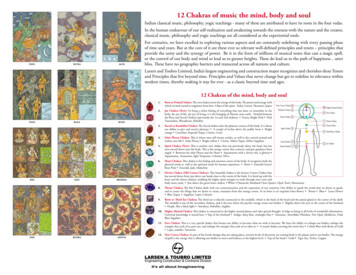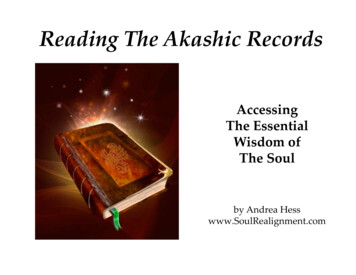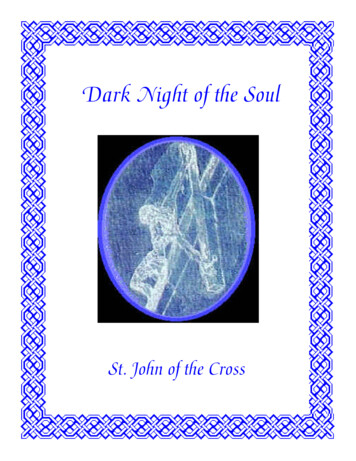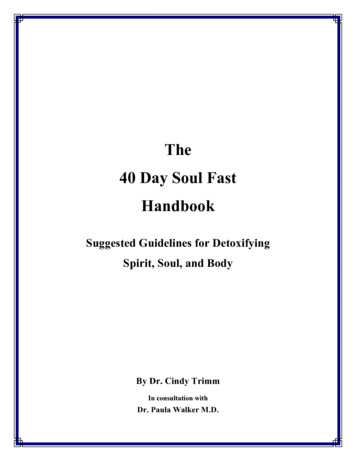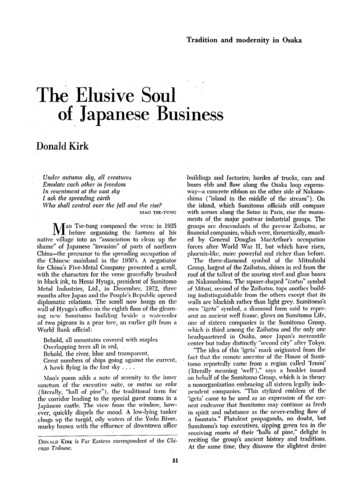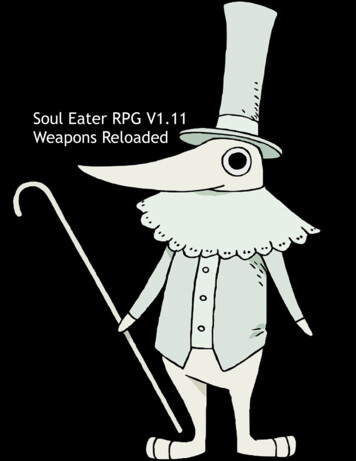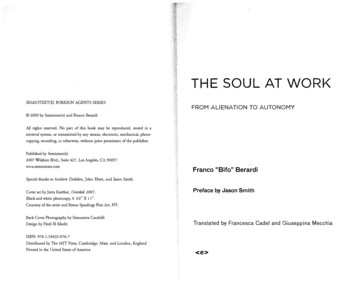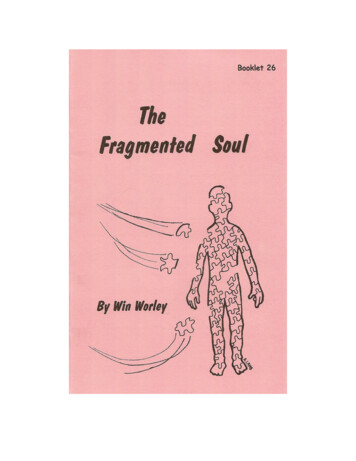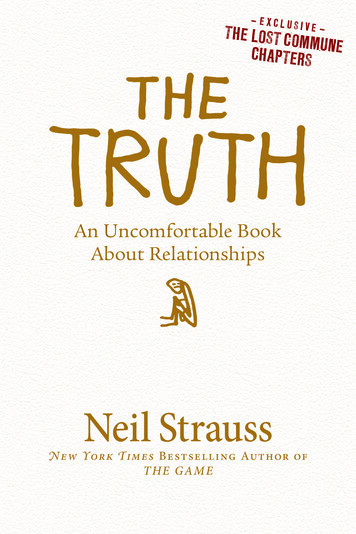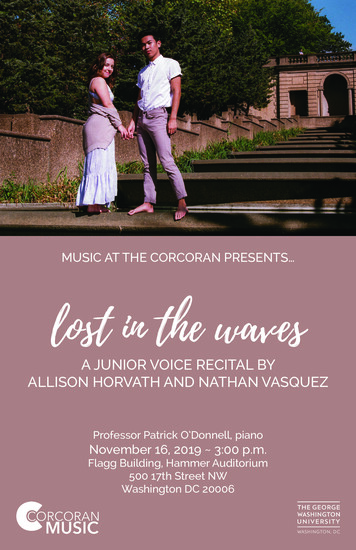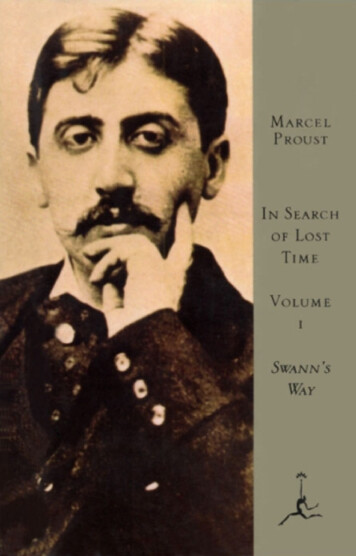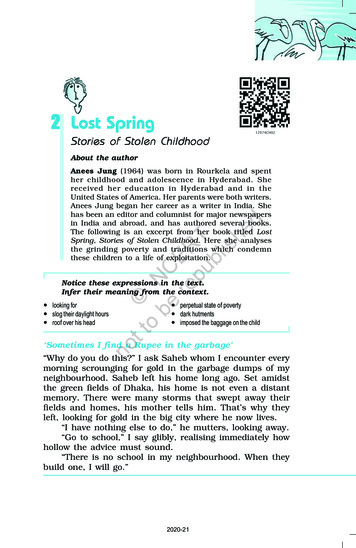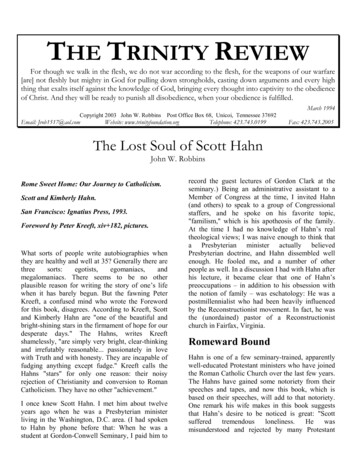
Transcription
THE TRINITY REVIEWFor though we walk in the flesh, we do not war according to the flesh, for the weapons of our warfare[are] not fleshly but mighty in God for pulling down strongholds, casting down arguments and every highthing that exalts itself against the knowledge of God, bringing every thought into captivity to the obedienceof Christ. And they will be ready to punish all disobedience, when your obedience is fulfilled.March 1994Copyright 2003 John W. Robbins Post Office Box 68, Unicoi, Tennessee 37692Email: Jrob1517@aol.comWebsite: www.trinityfoundation.orgTelephone: 423.743.0199Fax: 423.743.2005The Lost Soul of Scott HahnJohn W. RobbinsRome Sweet Home: Our Journey to Catholicism.Scott and Kimberly Hahn.San Francisco: Ignatius Press, 1993.Foreword by Peter Kreeft, xiv 182, pictures.What sorts of people write autobiographies whenthey are healthy and well at 35? Generally there . There seems to be no otherplausible reason for writing the story of one’s lifewhen it has barely begun. But the fawning PeterKreeft, a confused mind who wrote the Forewordfor this book, disagrees. According to Kreeft, Scottand Kimberly Hahn are "one of the beautiful andbright-shining stars in the firmament of hope for ourdesperate days." The Hahns, writes Kreeftshamelessly, "are simply very bright, clear-thinkingand irrefutably reasonable. passionately in lovewith Truth and with honesty. They are incapable offudging anything except fudge." Kreeft calls theHahns "stars" for only one reason: their noisyrejection of Christianity and conversion to RomanCatholicism. They have no other "achievement."I once knew Scott Hahn. I met him about twelveyears ago when he was a Presbyterian ministerliving in the Washington, D.C. area. (I had spokento Hahn by phone before that: When he was astudent at Gordon-Conwell Seminary, I paid him torecord the guest lectures of Gordon Clark at theseminary.) Being an administrative assistant to aMember of Congress at the time, I invited Hahn(and others) to speak to a group of Congressionalstaffers, and he spoke on his favorite topic,"familism," which is his apotheosis of the family.At the time I had no knowledge of Hahn’s realtheological views; I was naive enough to think thata Presbyterian minister actually believedPresbyterian doctrine, and Hahn dissembled wellenough. He fooled me, and a number of otherpeople as well. In a discussion I had with Hahn afterhis lecture, it became clear that one of Hahn’spreoccupations – in addition to his obsession withthe notion of family – was eschatology: He was apostmillennialist who had been heavily influencedby the Reconstructionist movement. In fact, he wasthe (unordained) pastor of a Reconstructionistchurch in Fairfax, Virginia.Romeward BoundHahn is one of a few seminary-trained, apparentlywell-educated Protestant ministers who have joinedthe Roman Catholic Church over the last few years.The Hahns have gained some notoriety from theirspeeches and tapes, and now this book, which isbased on their speeches, will add to that notoriety.One remark his wife makes in this book suggeststhat Hahn’s desire to be noticed is great: ood and rejected by many Protestant
2The Trinity Review March 1994Two other men defected to Rome as a result ofHahn’s influence: his seminary classmate GeraldMatatics, and Presbyterian Church in Americaminister William Bales. Other defections, such asthat of author Thomas Howard, are apparentlyunrelated to Hahn’s. Why were these men seducedby Rome? The answers to that question arecomplex. Each man’s seduction is probably unique.But there are some features of Hahn’s seduction thatreveal fatal weaknesses in what passes forcontemporary Protestant Christianity. Today Hahnteaches at the Franciscan Seminary of Steubenville(Ohio), a charismatic Roman Catholic institution.His wife, the daughter of a Presbyterian clergyman,is also a graduate of Gordon-Conwell: She wantedto be a pastor, she says.charismatic experience in high school. In his senioryear, he met the Presbyterian John Gerstner, "one ofmy favorite theologians" (31). While in high school,Hahn also became enamored of Luther and Calvin,apparently because they appealed to his need forheroes: "I decided the figures in Christian historywho most appealed to me.were the great protestantreformers Martin Luther and John Calvin" (5). Butthe theologies of Luther and Calvin seemed to playrelatively small parts in Hahn’s thinking; he wasfascinated by other things. A guitarist, Hahn likedmodern music: "The summer before going off tocollege, I toured the United States, Scotland,England and Holland, playing guitar in a Christianmusical group, the Continentals" (13). Hahnattended the theologically liberal but economicallyconservative Grove City College, a collegeaffiliated with the mainline Presbyterian church,where he concentrated in theology, philosophy, andeconomics, and continued his activity in YoungLife. While in college, Hahn "discovered that thecovenant was really the key for unlocking the wholeBible" (17). Beware the man who thinks he hasdiscovered some sort of "key" for understanding theBible, whether it is the idea of covenant, a schemeof dispensations (instituted by covenants), or a fivepoint covenantal model.Liberalism and ArminianismThomism and EvidentialismThe first of the reasons for Hahn’s conversion toRomanism is liberalism and Arminianism. Hahntells us that he was "baptized a Presbyterian" and"raised in a nominal Protestant home. Church andreligion played a small role in my life and for myfamily." As a teenager, he was a drug-usingcriminal who lied his way out of jail: "Faced with ayearlong sentence to a detention center for a varietyof charges, I barely lied my way out of the sentenceand into six months of probation instead" (1). Inhigh school Hahn became active in Young Life, anArminian evangelistic group. There he read PaulLittle and C. S. Lewis. He also had some religiousexperiences: "Before finishing my sophomore year,I experienced the transforming power of God’sgrace in conversion. Within the next year, Iexperienced a special outpouring of the Holy Spiritin a personal and life-changing way." ApparentlyHahn had both a conversion experience and aThe second major factor influencing Hahn’sconversion to Rome seems to be the official RomanCatholic philosophy of Thomas Aquinas andevidentialism. While at nominally Protestant GroveCity College, Hahn "had become enamored withand steeped in the philosophy of Saint Thomas. Inspite of my anti-Catholic outlook, I had known agood thing when I found it, and in my mind, no onecould compare to Aquinas. I had devoured hisphilosophical writings, especially his metaphysics,eventually acquiring the odd and unlikely reputationfor being an ‘evangelical Thomist’ " (101).friends who didn’t want to talk to him. He felt thatformer professors didn’t think he was worthpursuing to convince him he was wrong [aboutScripture]. And he couldn’t understand thenonchalance of a number of [Roman] Catholics atMarquette [University, where Hahn was a student atthe time] over his conversion, acting rather hohumover the whole thing, rather than welcoming him forall he had risked and left behind" (109). What goodis being a martyr if no one notices you?During his first years in Gordon-Conwell Seminary,1979-81, Hahn suffered from a confused mentalstate: "At this point I would describe my study as adetective story. I was searching Scripture todiscover clues as to the whereabouts of realChristianity" (25). Although Hahn does not mention
3The Trinity Review March 1994it in the book, his tuition at Gordon-Conwell waspaid by a Calvinist Christian businessman whowanted to support a student who understood bothfree market economics and Christian theology, forthe purpose of being able to teach economics toclergymen and Christian theology to economists.Hahn was highly recommended to the businessmanby the Chairman of the Economics Department atGrove City. What Hahn learned at Grove City wasThomism, and his interest in economics – which hesays he studied only to mollify his "practical"father, not because he was genuinely interested inthe subject – has disappeared. Hahn’s obsession isto convert Christians to Catholicism, not to educateclergymen about principles of economics oreconomists about Christian theology. He owes oneChristian businessman many thousand dollars andhis former economics professor an apology.As for Kimberly, "At this point [more than halfwaythrough seminary] I was not steeped in Reformationtheology, so the change in how I viewedjustification did not seem momentous" (42). Pleaseconsider the import of that statement. Here are twograduates of a Presbyterian College, two studentsnearing completion of their studies at reputedly oneof the best evangelical Protestant seminaries in thecountry, two professing Christians – and themeaning of justification is not all that important tothem. As we shall soon see, despite – or ratherbecause of – their education, the Hahns – especiallyScott – could not defend the Reformation principlesof the Bible alone, faith alone, and Christ alone.Justitication by WorksNorman ShepherdThe fourth major influence on Hahn’s conversion toRomanism was the Reconstructionist movement.After attending seminary, Hahn had intended tostudy theology at the University of Aberdeen inScotland, where he had been acc.epted, but hechanged his mind because of Margaret Thatcher:"Margaret Thatcher made it almost impossible forAmericans to have babies at British taxpayers’expense; so we took this as sign for us to lookelsewhere for work, delaying doctoral studies for awhile" (32). Not having paid for his own education,Hahn apparently did not intend to pay for hischildren either. The principles of economics seem tohave been quite forgotten.andWhile he was at Gordon-Conwell being supportedby a Calvinist Christian businessman, Hahn adoptedthe Roman Catholic view of justification: "WhenChrist formed the New Covenant with us, then, itwas much more than a simple contract or legalexchange, where he took our sin and gave us hisrighteousness, as Luther and Calvin explained it.In fact, I discovered that nowhere did Saint Paulever teach that we were justified by faith alone!Sola fide was unscriptural! "I was so excited aboutthis discovery. I shared it with some friends, whowere amazed at how much sense it made. Then onefriend stopped me and asked if I knew who else wasteaching this way on justification. When Iresponded that I didn’t, he told me that Dr. NormanShepherd, a professor at Westminster TheologicalSeminary (the strictest Presbyterian Calvinistseminary in America) was about to undergo aheresy trial for teaching the same view ofjustification that I was expounding. "So I calledProfessor Shepherd and talked with him. He said hewas accused of teaching something contrary to theteachings of Scripture, Luther and Calvin. As Iheard him describe what he was teaching, I thought,Hey, that is what I’m saying" (30-31).ReconstructionismTheonomyandInstead, Hahn was hired as pastor and schoolteacherby a Reconstructionist church in Fairfax, Virginia:"When I candidated for the position at TrinityPresbyterian Church, I shared my views andconcerns regarding justification – that I took Dr.Shepherd’s position. They understood and said theydid, too. So shortly before graduation, I acceptedthe pastorate at Trinity, as well as a teachingposition in their high school, Fairfax ChristianSchool" (33). The Reconstuctionist church was notfooled: They knew quite well that Hahn haddefected from the Biblical doctrine of justificationby faith, and they wanted him for that reason.
4The Trinity Review March 1994While pastoring the Reconstructionist church, Hahn"began to see how important liturgy was for thecovenant. Liturgy represented the way Godfathered the covenant family." (43). "Myparishioners grew excited. The elders even askedme to revise our liturgy." While teaching his ideasat the school, his Roman Catholicism was soobvious that several of his students told him hewould join the Roman Catholic church. (Someoneshould write a book about Reconstructionistchurches and their affinity for Roman Catholic andOrthodox liturgy and doctrine.) Hahn was alsoinvited to teach at Dominion Theological Institute(which later merged with Chesapeake TheologicalSeminary). During this period he became convincedof the Roman doctrine that Jesus Christ wasphysically present in the bread and the wine. Thus,when one participates in mass, one is eating thephysical body and drinking the physical blood ofChrist. The proper name for the practice – ifCatholics were actually doing what theydogmatically assert that they are doing – is ritualcannibalism.Hahn was also teaching his seminary students –contrary to what the seminary itself believed,contrary to what he was being paid to teach, andwithout informing the leadership of the seminary –that justification by faith alone was false. The factthat he was denying the Christian doctrine ofjustification while being paid to teach it does notseem to bother him. Oddly, Hahn opens his bookwith this story designed to illustrate his lifelonghonesty: "I recall the last time I ever attended ourfamily’s church. The minister was preaching allabout his doubts regarding the Virgin Birth of Jesusand his bodily Resurrection. I just stood up in themiddle of his sermon and walked out. I rememberthinking, I’m not sure what I believe, but at leastI’m honest enough not to stand up and attack thethings I’m supposed to teach" (1). But that isexactly what Hahn did when he taught seminaryclasses, and that is exactly what he did when heaccepted money for seminary tuition under falsepretenses. After Hahn attacked sola fide in hisseminary classes in Virginia, one of the studentschallenged him to defend sola scriptura. He couldnot (51-52). After seven years in "Protestant"educational institutions, and now a Presbyterianminist
I once knew Scott Hahn. I met him about twelve years ago when he was a Presbyterian minister living in the Washington, D.C. area. (I had spoken to Hahn by phone before that: When he was a student at Gordon-Conwell Seminary, I paid him to record the guest lectures of Gordon Clark at the seminary.) Being an administrative assistant to a Member of Congress at the time, I invited Hahn (and others .
